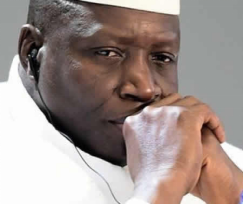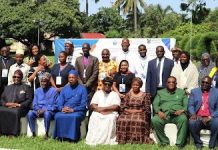By Yankuba Jallow & Kemeseng Sanneh (Kexx)
A constitutional legal challenge launched by a group of landowners in Batokunku has brought fresh scrutiny to the Gambian government’s handling of property rights, as residents allege a continued pattern of unlawful land deprivation dating back to the Yahya Jammeh era. The Batokunku Home Owners Association (BHA), representing affected residents, filed a constitutional application at the High Court to declare that the state has violated their right to property and equal treatment under the law.
Filed under Sections 22, 33, and 37 of the 1997 Constitution, the legal action names the Minister for Local Government and Lands as the first respondent and the Attorney General as the second. The application, brought through attorney Malick H.B. Jallow, requests the enforcement of fundamental rights and seeks both legal redress and compensation amounting to GMD 12 million.
According to court documents, the BHA represents 40 landowners, 12 of whom are directly affected by what the Association calls a prolonged and discriminatory denial of access to their legally acquired properties in Batokunku, located in the West Coast Region. The residents claim they purchased their plots between 2006 and 2010 from the village Alkalo and indigenous landowners, with legal documents, rates, and development plans in place.
But their use and quiet enjoyment of the land was disrupted when former President Yahya Jammeh allegedly extended his control over the area beyond the initial allocation granted to him by the village kabilo around the year 2000. Initially fenced and used for cattle rearing and later black sand mining, Jammeh allegedly ordered the seizure of surrounding lands — including plots owned by BHA members — without compensation. This led to demolitions, arrests, and threats that reportedly continued even after the fall of his regime.
Mamie Ceesay, a member of the Association who swore an affidavit in support of the application, recounted how homes were destroyed, properties vandalised, and residents forcibly removed. The affidavit alleges that since 2017, the new administration has failed to reverse these injustices, despite repeated attempts by the Association to seek redress through formal channels, including the Ministry of Justice, the Ministry of Tourism, the Governor of the West Coast Region, and the Ministry of Lands.
“Successive applications for permits to rebuild the arbitrarily demolished structures have been denied,” the affidavit states. “Meanwhile, the same authorities continue to collect rates and taxes from BHA members on these very properties.”
The homeowners argue this treatment violates their constitutional rights to property and non-discrimination. They are asking the court to order the Ministry of Lands to immediately issue all necessary permits and clearances to enable them to develop their plots. In addition to a demand for GMD 12 million in compensation, they are seeking reimbursement of legal and administrative fees totalling GMD 1.2 million.
Crucially, the BHA claims that while their members have been denied access, neighbouring landowners in the same locality continue to develop and live on their plots undisturbed. They also point to other communities such as Sifoe and Brufut, whose lands — also confiscated during the Jammeh era — have since been returned.
The Association views this discrepancy as evidence of selective enforcement and discrimination. “The continued deprivation of our properties, while others within the same context are unaffected, is discriminatory and should not pass without repercussions,” Ceesay said in the affidavit.
Adding to residents’ frustrations are allegations that an area adjacent to the disputed land was recently allocated by the government to a politically connected businessman, who sold the land to a real estate company now actively developing and marketing residential plots. The BHA members say this development only adds insult to injury and strengthens their claims of bias and injustice.
The legal summons, dated February 19, 2024, instructed the respondents to enter an appearance within eight days of service. The case has already suffered delays, with missed court dates and procedural disputes. On Thursday, 12 June 2025, the matter came before Justice Isatou Janneh at the High Court in Banjul.
During the hearing, State Counsel William Drammeh moved to withdraw an earlier motion for preliminary objection dated 30 April and instead asked the court to consider a new motion filed on 2 June. Senior Counsel Malick Jallow, representing the applicants, confirmed receipt of the new motion but told the court it had not been formally served on the judge. Justice Janneh agreed, indicating the motion was not before her and could therefore not be heard.
Jallow reminded the court that it was the responsibility of the state to ensure proper service, to which Drammeh offered an apology. Jallow further objected to the substance of the new motion, contending that the title “Motion for Preliminary Objection” was procedurally improper and that the state had failed to comply with legal standards for filing such motions as outlined in a Court of Appeal decision.
Justice Janneh subsequently adjourned the case to 16 July for hearing on the motion.
Observers say the outcome of this case could have broader implications for post-Jammeh land justice and constitutional accountability. It also revives questions about the status of recommendations made by the Janneh Commission of Inquiry, which called for the restitution of properties unjustly taken during the former regime.
“Our members have endured nearly two decades of loss, fear, and silence,” a spokesperson for the Association said. “This case is about more than just land. It’s about restoring dignity and justice in a country that promised change.”
As the court prepares to resume proceedings next month, the fields of Batokunku — some fenced, others reduced to rubble — stand as physical reminders of a national struggle between power, property, and the rule of law.


















